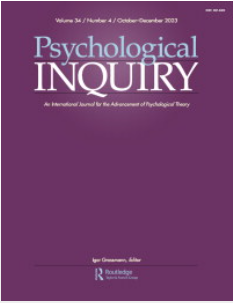自我建构、自我保护与自我提升:身份保护的稳态模型
IF 4.1
2区 心理学
Q1 PSYCHOLOGY, MULTIDISCIPLINARY
引用次数: 8
摘要
摘要自我保护和自我增强,曾经被描述为阻碍准确自我认识和有效环境控制的偏见,最近被视为可能产生偶然、适应性后果的错误信念。我将身份保护和增强机制作为一个常规的自适应系统的一部分,从而迈出下一步。生物稳态调节生理过程,而心理稳态调节威胁所需身份的情绪状态。阐述了心理稳态的本质,它调节的身份系统,以及保护它免受伤害的免疫系统。我讨论了在日常心理活动中构建自我观点和叙事,以及对同期威胁的修复反应,类似于免疫系统对破坏身体初始防御的微生物的反应。利用基本免疫学原理,区分先天免疫和适应性心理免疫,将疾病的传播与相关自我观点和叙事中的威胁信息的传播进行比较,并考虑生物和心理免疫系统的“记忆”,以纠正未来的威胁。此外,我提出了一组命题,其中包括对免疫各个方面的预测,并最终考虑了意识和自欺在免疫过程中的作用。本文章由计算机程序翻译,如有差异,请以英文原文为准。
Self-Construction, Self-Protection, and Self-Enhancement: A Homeostatic Model of Identity Protection
Abstract Self-protection and self-enhancement, once depicted as biases that impede accurate self-knowledge and hinder effective environmental control, have more recently been viewed as misbeliefs that can have fortuitous, adaptive consequences. I take the next step forward by construing identity protection and enhancement mechanisms as part of a routine, adaptive system. Whereas biological homeostasis regulates physiological processes, psychological homeostasis regulates the emotional states that threaten a desired identity. Ι elaborate on the nature of psychological homeostasis, the identity system that it modulates, and the immune system that safeguards it from harm. Ι discuss the construction of self-views and narratives in the ordinary stream of mental activity, as well as reparative responses to contemporaneous threats, similar to the immune system’s response to microbes that breach the body’s initial defenses. Using basic immunological principles, Ι distinguish between innate and adaptive psychological immunity, compare the spread of disease to that of threatening information among related self-views and narratives, and consider the “memories” of the biological and psychological immune systems to redress future threats. In addition, Ι offer a set of propositions that include predictions about various aspects of immunity, and end by considering the roles of awareness and self-deception in the immunity process.
求助全文
通过发布文献求助,成功后即可免费获取论文全文。
去求助
来源期刊

Psychological Inquiry
PSYCHOLOGY, MULTIDISCIPLINARY-
CiteScore
10.30
自引率
1.10%
发文量
31
期刊介绍:
Psychological Inquiry serves as an international journal dedicated to the advancement of psychological theory. Each edition features an extensive target article exploring a controversial or provocative topic, accompanied by peer commentaries and a response from the target author(s). Proposals for target articles must be submitted using the Target Article Proposal Form, and only approved proposals undergo peer review by at least three reviewers. Authors are invited to submit their full articles after the proposal has received approval from the Editor.
 求助内容:
求助内容: 应助结果提醒方式:
应助结果提醒方式:


